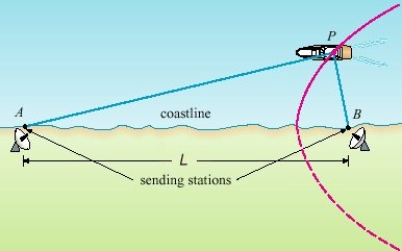In the LORAN (LOng RAnge Navigation) radio navigation system, two radio stations located at A and B transmit simultaneous signals to a ship or an aircraft located at P. The onboard computer converts the time difference in receiving these signals into a distance difference  , and this, according to the definition of a hyperbola, locates the ship or aircraft on one branch of a hyperbola (see the figure) . Suppose that station B is located L =
, and this, according to the definition of a hyperbola, locates the ship or aircraft on one branch of a hyperbola (see the figure) . Suppose that station B is located L =  mi due east of station A on a coastline. A ship received the signal from B
mi due east of station A on a coastline. A ship received the signal from B  microseconds (µs) before it received the signal from A. Assuming that radio signals travel at a speed of
microseconds (µs) before it received the signal from A. Assuming that radio signals travel at a speed of  ft /µs and if the ship is due north of B, how far off the coastline is the ship? Round your answer to the nearest mile.
ft /µs and if the ship is due north of B, how far off the coastline is the ship? Round your answer to the nearest mile. 
A)  miles
miles
B)  miles
miles
C)  miles
miles
D)  miles
miles
E)  miles
miles
Correct Answer:
Verified
Q7: Consider the polar equation Q8: Write a polar equation of the conic Q9: Find the equation of the directrix of Q10: Write a polar equation in r Q11: Find an equation for the conic that Q13: Find an equation of the hyperbola centered Q14: Find an equation for the conic that Q15: The orbit of Hale-Bopp comet, discovered in Q16: Suppose a planet is discovered that revolves Q17: Write a polar equation in r![]()
Unlock this Answer For Free Now!
View this answer and more for free by performing one of the following actions

Scan the QR code to install the App and get 2 free unlocks

Unlock quizzes for free by uploading documents